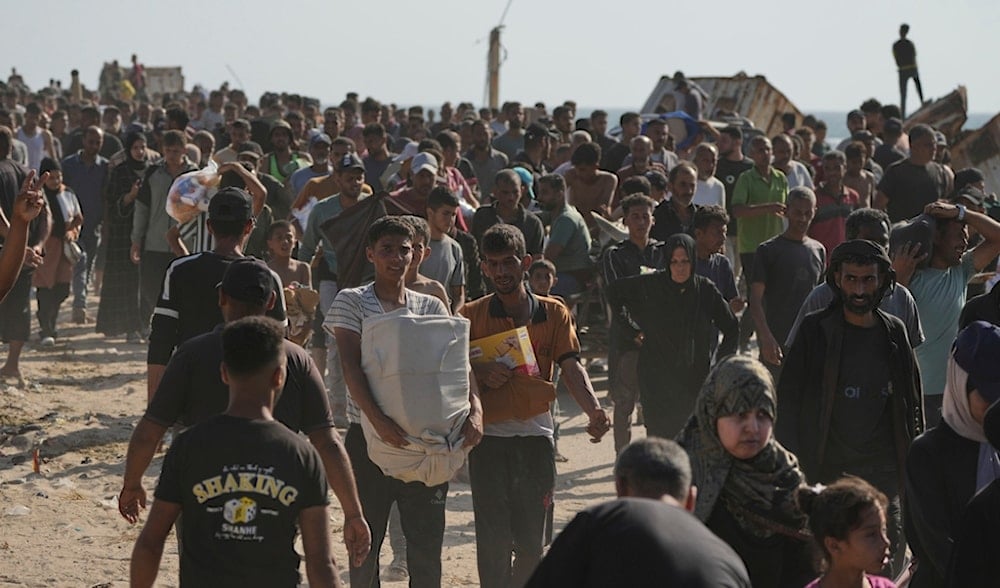EU reviews association agreement with 'Israel' over Gaza crisis
The European Union is reviewing its association agreement with "Israel", citing concerns over the humanitarian crisis in Gaza.
-

Palestinians carry boxes containing food and humanitarian aid packages delivered by the Gaza Humanitarian Foundation in Rafah, southern Gaza Strip, on May 27, 2025. (AP)
Tensions between "Israel" and the European Union have escalated following the European Commission’s decision to launch a formal review of the EU-"Israel" association agreement.
The move, triggered by mounting concern over the humanitarian catastrophe in Gaza, could lead to a partial suspension of cooperation with "Israel" in the coming weeks, a senior EU diplomat told Al-Monitor.
Seventeen of the EU’s 27 member states backed the Dutch proposal on May 20 to revisit the agreement. According to the diplomat, Vice President of the European Commission Kaja Kallas held repeated discussions with Israeli Foreign Minister Gideon Saar, but no meaningful steps were taken by the Israeli government to ease conditions in Gaza, leaving EU officials with little alternatives.
Signed in 1995 and implemented in 2000, the agreement governs cooperation in trade, science, education, and culture. Article 2 obliges signatories to respect human rights, now the central legal basis for the review, given "Israel’s" restrictions on humanitarian aid to Gaza.
European diplomats indicate a swift timeline, with concrete actions expected to be discussed at the next EU foreign ministers’ meeting on June 23.
Horizon Europe and economic risks
One of the most impactful outcomes of the agreement could be the suspension of "Israel’s" participation in Horizon Europe, the EU’s flagship research and innovation program. The Israel Academy of Sciences and Humanities has warned that such a step poses a direct threat to the country’s research sector.
Between 2022 and 2024, Israeli researchers secured over €1 billion in Horizon grants, with more than 60% of co-authored publications involving European partners.
Exclusion from Horizon Europe would send a strong signal to academic and scientific institutions, many of which are already reconsidering their ties with "Israel" amid growing international scrutiny.
The EU was "Israel’s" largest trading partner in 2024, accounting for 32% of its total goods trade, amounting to €42.6 billion. While a full suspension of the free trade zone is unlikely, targeted measures introducing tariffs could damage "Israel’s" competitiveness in European markets.
The review comes amid wider European condemnation of "Israel’s" conduct in Gaza. On May 19, the leaders of Britain, France, and Canada issued a joint statement criticizing "Israel’s" “egregious actions” and warning of potential joint measures.
Kallas echoed this sentiment on May 20, saying, "The situation in Gaza is catastrophic. The aid that Israel has allowed in is, of course, welcomed, but it is a drop in the ocean."
On the diplomatic front, the May 21 incident in which Israeli forces opened fire on a delegation of EU diplomats visiting Jenin has further strained ties, with Kallas calling the incident "unacceptable" and demanding accountability.
Growing divide within the EU
While France, Spain, and Ireland are leading the push for accountability, nine countries, including Germany, Italy, and Greece, opposed the review. However, the support of countries like the Netherlands, Austria, and Romania indicates a shift in EU dynamics, potentially tipping the scale toward more decisive action.
The partial suspension of the association agreement could include halting political dialogue, removing "Israel" from Horizon Europe, or adjusting trade privileges under the Free Trade Agreement. These steps require a 55% majority among EU states, a threshold now within reach following the May 20 vote.
What comes next for EU-"Israel" relations?
The European Commission has not specified when it will publish its findings or recommendations. However, the upcoming June 23 meeting may serve as a pivotal moment, especially if the alleged US-"Israel" aid distribution initiative in Gaza fails to ease the humanitarian crisis.
For "Israel", the stakes are high. As Tamir Hayman, director of the Institute for National Security Studies, warned, “If and when Israel will be perceived as a country you do not do business with, our high-tech and defense tech risk collapsing.”
“The review decision is a step in the wrong direction,” said Haim Regev, "Israel’s" ambassador to the EU. “Constructive dialogue should be the path forward. Threats and punishments won’t advance anything.”
Yet, for many EU officials, the time for symbolic gestures has passed. As diplomatic and economic pressure mounts, "Israel’s" global isolation may deepen unless it addresses the humanitarian catastrophe in Gaza and complies with international human rights obligations.
Read more: Spanish FM calls for sanctions on 'Israel' amid aimless war on Gaza

 4 Min Read
4 Min Read










